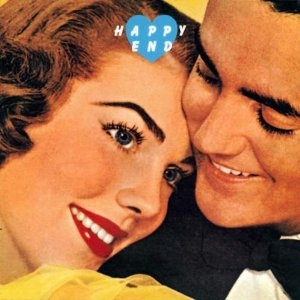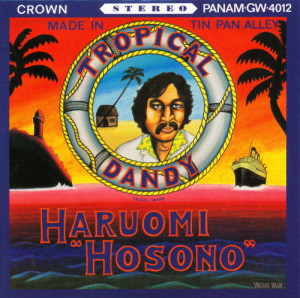
Happy End was a Japanese folk rock band active from 1969 to 1972. Composed of Haruomi Hosono, Eiichi Ohtaki, Takashi Matsumoto and Shigeru Suzuki, the band's pioneering sound was regarded as avant-garde to most Japanese at the time. They are considered to be among the most influential artists in Japanese music. MTV described Happy End's music as "rock with psych smudges around the edges."

Haruomi Hosono, sometimes credited as Harry Hosono, is a Japanese musician, singer, songwriter and record producer. He is considered to be one of the most influential musicians in Japanese pop music history, credited with shaping the sound of Japanese pop for decades as well as pop music outside of Japan. He also inspired genres such as city pop and Shibuya-kei, and as leader of Yellow Magic Orchestra, contributed to the development and pioneering of numerous electronic genres.
Masataka Matsutoya is a Japanese arranger, composer, music producer, and motor journalist. He currently resides in Setagaya, Tokyo. He is a graduate of Keio Senior High School and Keio University. His wife is singer-songwriter, composer, and lyricist Yumi Matsutoya. His mother, Kazuko, is the auditor of Kirarasha, the firm Masataka established after his marriage to Arai.

Kazemachi Roman is the second album by Japanese folk rock band Happy End, released on URC Records in 1971. In this concept album, Happy End attempted to paint a musical picture of Tokyo before the 1964 Summer Olympics, through which sweeping changes transformed the city forever.

Casiopea World Live '88 is the fifth live album released by the jazz fusion group Casiopea in 1988. It is a compilation Album consisting of recordings of some of their songs played in concert during Casiopea's World Tour in 1988 that promoted their previous album "Euphony". It is also a collaboration album with two Japanese horn sections from two other bands, the brass section of "Spectrum" and the brass Section of "The Tops". Additionally, it is the first album Spectrum recorded since their breakup in 1981, and is their penultimate album. Lead trumpeter/vocalist of Spectrum, Ichiro Nitta, was also the Producer of "The Tops" at the time this album was released. Tops released one more album, "Soul Children", the following year, before they disbanded in 1991. That same year, Spectrum released their "Super Remix" album. This was also the last album to feature Tetsuo Sakurai on Bass and Akira Jimbo on Drums, who both left to form the band Jimsaku.

Happy End is the self-titled debut album by Japanese folk rock band Happy End. Because their third album is also self-titled, although written in English, this first album is also known by the name "Yudemen" (ゆでめん) after the sign depicted in the cover art.

Shōtaijō no Nai Show (招待状のないショー) is the fifth studio album by Japanese singer-songwriter Yosui Inoue, issued in March 1976. It was the first long-play record he released under the For Life Records, a record label that he joined as one of the co-founders and started in 1975.

Omni Sight Seeing is a 1989 album by Haruomi Hosono.

Happy End is the third and final album by Japanese folk rock band Happy End. It was recorded in Los Angeles, produced by Van Dyke Parks and features several American session musicians such as Lowell George and Bill Payne of the band Little Feat.

Cobalt Hour, stylized as COBALT HOUR, is Yumi Arai's third studio album, released on June 20, 1975 by Toshiba EMI/Express. The album was also distributed by Alfa Records for a period of time, as Alfa also held ancillary rights to this and the other LPs Arai released during the time Alfa was still a publishing company; those rights later reverted to EMI Japan in 1994-thereabouts, when EMI regained distribution of Alfa's catalogue except for the artists who were published by Alfa and were distributed by other labels. On April 26, 2000, the recording was digitally remastered for re-release on CD by Bernie Grundman. Internet sales of the album began March 10, 2005.

Tropical Dandy is Haruomi Hosono's second solo album. This album continues the tropical style of Hosono House and also features performances from "Caramel Mama". This album was re-issued as part of a box set with bonus tracks taken from Tin Pan Alley albums by Crown decades later.

Bon Voyage co. is Haruomi Hosono's third solo album. This album continues the tropical style of Hosono House and Tropical Dandy while showing influence from the music of New Orleans and also features performances from Tin Pan Alley and Happy End. The album's Japanese title was influenced by a Nagasaki convenience store of the same name that Hosono met while on Tin Pan Alley's "First & Last Concert Tour". This album was re-issued as part of a box set with the single version of the Tropical Dandy song "Peking Duck" and an interview Hosono gave on a Tokyo Broadcasting System radio show.

Paraiso is Haruomi Hosono's fourth solo album and Yellow Magic Band's first album. This album continues the tropical style of Hosono House, Tropical Dandy and Bon Voyage co., while being influenced by the music of Hawaii and Okinawa, incorporating electronic sounds that would be later developed on Hosono's and YMO's careers. YMO, The Yellow Magic Band at this point in time, was composed of Tin Pan Alley members and studio musicians, such as Hosono's former Happy End bandmate Shigeru Suzuki and future YMO members Ryuichi Sakamoto and Yukihiro Takahashi, as well as guitarist Hirofumi Tokutake.

Thousand Knives is the debut solo album by Japanese musician Ryuichi Sakamoto. The album is named after Henri Michaux's description of the feeling of using mescaline in Miserable Miracle.

Saravah! is the debut solo studio album by Japanese multi-instrumentalist Yukihiro Takahashi. Named after Pierre Barouh's record label of the same name, Takahashi conceived the album during his tenure on The Sadistics. The album is based on French pop music, and would later show up on early Yellow Magic Orchestra material. Besides Takahashi, this album features performances by members of The Sadistics, YMO and Tin Pan Alley. Due to the album being made before YMO members started using computers, Sakamoto got involved in arranging the music; all the keyboard parts on the album are dubbed instead of sequenced.
Shigeru Suzuki is a Japanese musician, songwriter and guitarist. He first became known as a member of the influential rock band Happy End in the early 1970s, before starting a solo career and becoming a prolific session musician. As of 2006, Suzuki had contributed to 588 recordings. In 2019, Suzuki's high school band Skye reunited and released their first album.

Band Wagon is the 1975 debut solo album of Japanese musician Shigeru Suzuki recorded with musicians from Los Angeles. Two singles were released from the album "The Smell of August"/"Snow Express" and "100-Watt Lover", both in 1975.

Pacific Breeze: Japanese City Pop, AOR and Boogie 1976–1986 is a 2019 compilation album. The album was released by Light in the Attic Records on May 3, 2019, as the third part of their Japan Archival Series, starting with Even a Tree Can Shed Tears: Japanese Folk & Rock 1969–1973.

Hikō-ki Gumo, stylized as HIKŌ-KI GUMO, is the debut studio album by Japanese singer-songwriter Yumi Arai, released in November 1973. The album is most known for its title track.

Misslim, is the second studio album by Japanese singer-songwriter Yumi Arai, released in October 1974.


















